In a significant intervention touching upon human dignity and privacy, the Karnataka High Court has barred the State government from using “strip and search” methods to identify transgender persons during an ongoing survey. The Bench made it clear that such practices have no place in a civilised society. The survey, which began on September 15, was meant to collect data about the transgender community in the State for welfare purposes - but quickly came under fire for the manner in which it was being conducted.
Background
The case was brought before the Court by the Anita Humanitarian Foundation, a Bengaluru-based organisation working for transgender rights. The petition argued that the State’s survey violated both the Transgender Persons (Protection of Rights) Act, 2019, and fundamental rights guaranteed under Articles 14 and 21 of the Constitution.
According to the petitioner, survey officials had reportedly conducted “strip and search” procedures in some hospitals to verify participants’ gender - an act that was described as “humiliating and degrading.” They further pointed out that the government already maintains identity cards for transgender persons, making such a verification exercise unnecessary.
As the petitioners’ lawyer put it, the issue was not about the survey itself, but “the intrusive and disrespectful manner in which it was being executed.”
Court’s Observations
A Division Bench of Chief Justice Vibhu Bakru and Justice C.M. Poonacha heard the matter on Wednesday. The judges appeared visibly concerned about the reports of invasive verification practices. “The Government of Karnataka and the persons conducting the survey shall ensure that before calling upon any of the persons to participate, they are informed that participation is strictly voluntary,” the Bench said during the hearing.
In its oral remarks, the Court underlined that even well-intentioned welfare measures must respect constitutional boundaries. “The dignity and privacy of individuals, particularly members of the transgender community, must not be compromised,” the Bench observed.
The Court also highlighted that such surveys, if not conducted properly, can reinforce stigma rather than promote inclusion. One of the judges remarked that no policy objective can justify an infringement on personal dignity - a statement that drew quiet nods from those present in the courtroom.
Read also:- Bombay High Court Allows Shilpa Shetty, Raj Kundra to Withdraw Travel Plea Amid ₹60 Crore
Decision
Issuing an interim order, the Court allowed the survey to continue but with strict conditions. It ruled that the participation of transgender persons must remain voluntary, and the State must not use any strip-search or physical verification methods.
Further, the Bench directed the government to keep all collected information strictly confidential, prohibiting its disclosure under any circumstance. The State has been asked to file an affidavit within three working days, detailing the steps taken to ensure data protection.
With these directions, the matter has been posted for the next hearing in December, giving the government time to respond.
As the courtroom dispersed, one could sense a feeling of cautious optimism among activists - relief that the Court had, at least for now, drawn a clear line between governance and intrusion.
Case: Anita Humanitarian Foundation v. State of Karnataka
Date of Order: October 15, 2025
Next Hearing: December 2025















